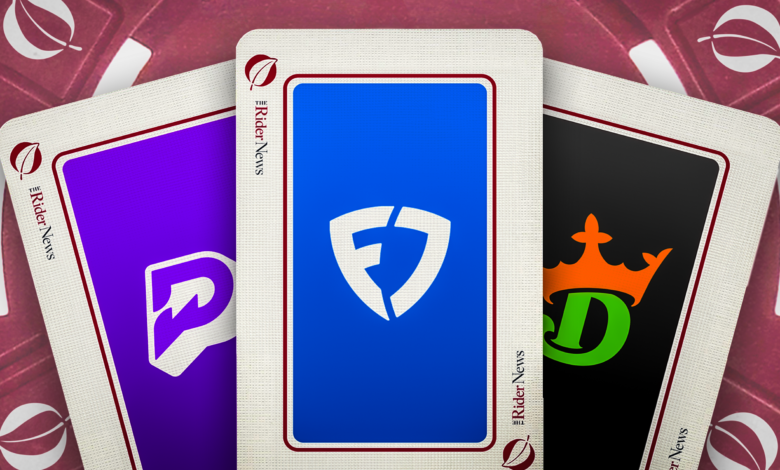
The reality of sports betting: how major is the wager?
By Hannah Newman
Instant money, marketing and gratification are synonymous with a single concept that many know by name but not entirely by effect: gambling. Today, there isn’t a need to visit a casino, just access to a smartphone app.
After the U.S. Supreme Court made the legalization of gambling a state matter in 2018, it made its way to universities, as approximately 75% of college students gamble and 67% sports bet as of May 2023, according to CollegeGambling.org and the NCAA.
As the Supreme Court ruling approaches its sixth anniversary, the growth of betting has created more jobs, attention to sports and quicker ways to win money.
However, the growth of something as compulsive and casual as gambling has also created problems for vulnerable people with poor finances and addictive habits, particularly college students.
Some states have considered banning sports betting apps from being used on college campuses to prevent young adults from creating lifelong addictions.
A decision and a collision
As sports betting slowly spread across the nation, companies like FanDuel and DraftKings became frequent sponsors of ESPN, prompting the network to discuss gambling more than ever before.
ESPN also signed a licensing agreement with Penn Entertainment in August 2023 to create its own U.S. sportsbook, ESPN BET.
The collision between gambling companies and sports media outlets has made sports betting a mainstream topic in the industry, according to Rider sports media professor AJ Moore.
“The legality of [sports betting] has just given the opportunity for more people to be heard in a public forum,” said Moore. “People who are critical are also finding a way to get their voices heard.”
Whether it’s positive or negative coverage, sports betting has carved out a spot in the media’s everyday output.
“You can’t turn a sports event on television without seeing an ad for FanDuel and DraftKings,” said sports media professor Chuck Bausman.
Companies like FanDuel have strategically used their digital presence to market gateway gambling by making enticing offers to first-time bettors. FanDuel offers a “No Sweat First Bet” of up to $1,000. If someone makes a $1,000 bet and loses it, the money will be returned to their account.
“[Sportsbooks] want to get people to sign up,” said Bausman. “The philosophy is, if you wait, you’re going to keep playing, and if you lose, you’re going to probably keep playing. You want to get back what you’ve lost.”
For many, the thrill of sports has effectively become a regular trip to the casino, as people now tune into games with both their eyes and wallets, hoping for more than just a win for their favorite team.
The 2024 Super Bowl had 14 million bets placed on FanDuel totalling $307 million, which set records, according to PBS.org.
However, DraftKings was the leading sports betting operator by coverage with licenses to operate in 20 states, according to GamblingIndustryNews.com. Fifteen million bets were placed via DraftKings, according to oddschecker.com
Stitching the game’s fabric
An understanding of sports betting has become critical for the sports media industry, making senior analyst at SportsHandle and professor Jeff Edelstein motivated to make it as prominent in his students’ education as it is in reality.
Edelstein teaches Covering the Sports Betting Industry at Rider, a course that was introduced in fall 2022 and is now required for the sports media major.
“I took a job three years ago covering the gambling industry and I realized that it’s created a massive swell of new jobs that are adjacent,” said Edelstein. “Just like you know what an RBI is in baseball or a touchdown in football is, you’re going to have to know what a three-team parlay is.”
Covering the Sports Betting Industry teaches students how to break down financial reports from both state governments and gambling operators, how to cover legislative action on gambling and how to navigate the business.
Former student of the class and Rider alum Carolo Pascale ’23 said, “It adds something that’s very unique to the major. … It’s pretty much being shoved down people’s throats to a point where you kind of can’t ignore it anymore.”
The weaving of sports betting into the everyday relevance of the industry has left no doubt that the fast-growing prospect of gambling has a secure future in the business.
“It’s only been five years; it’s very quickly becoming the fabric of the game,” Edelstein said.
The expansion of jobs within sports betting all revolve around the principle of promoting gambling, which from certain perspectives could be opening a gateway to addiction.
Harmful or helpful?
The amount of advertisement in the industry has led to increased numbers of both revenue and gamblers over the years.
According to GamblingIndustryNews.com, “Commercial sportsbooks and mobile sports betting operators combined to generate more than $7.5 billion in revenues during 2022. This marked a 72.7% increase on the previous year.”
DraftKings alone hit a $13.38 billion budget cap in 2023, according to GamblingIndustryNews.com.
Although there has been some discussion as to whether or not promoting gambling falls parallel to advertising tobacco, the certainty of it remains unknown.
“There’s a federal bill floating around that seeks to ban advertising of gambling, turning it into the rules of tobacco, but it hasn’t gained any traction,” said Edelstein.
In response to the science that young adults ages 18-24 are more likely to develop gambling habits, some college campuses have attempted to prevent students from falling victim to the habit of betting, one state being Maryland.
The state just announced a bill that bans students from using legal sports betting apps, in addition to passing a bill just last year that bans universities from partnering with sports betting operators, according to sportshandle.com.
Connecticut is looking to move forward with banning betting companies from partnering with universities.
Bausman responded to the idea and said, “If you buy into the power of advertising, that’s what makes it difficult for any addiction.”
Although there is no sign of abolishing betting apps at Rider, students and faculty acknowledge the high usage of betting apps and the mental battle students face deciding whether the chances of losing outweigh winning.
Although the future is unwritten, the rapid progress of the sports betting industry makes its effect on future generations an open-ended question.
If you have a gambling problem, call 1-800-GAMBLER.



